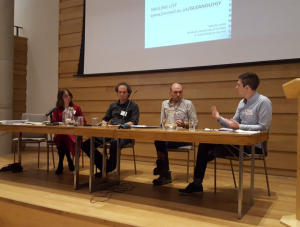Emelia Quinn and Ben Westwood discuss their recent conference on the notion of vegan theory partly supported by the AHRC-TORCH Graduate Fund.

Despite a wealth of scholarship examining the place of nonhuman animals within the humanities over the last few decades, there has seemed to be a reluctance to critically engage with the term ‘vegan.’ However, the publication of Laura Wright’s The Vegan Studies Project last year, alongside the growing sense of veganism’s urgent relevance to current ethical and environmental debates outside of the academy, as signalled by the UN’s urge for a global move towards meat and dairy-free diets, seems to signal the contemporary period as a seminal moment in the emergence of veganism as a significant field of critical enquiry and study. The Towards a Vegan Theory conference was hosted with the intention of bringing a wide range of interdisciplinary perspectives into conversation in order to benefit from, and develop, the heterogenous ways we might understand, theorise, and write about what it might mean to be vegan.
The overwhelming response to our call for papers, with speakers working across literature, history, history of art, theology, sociology, anthropology, and psychology, and across multiple institutions and continents, far surpassed all our expectations. Across such a wide berth of disciplines, it was particularly interesting to note the recurrence of the theme of failure, from failed witness to failed writing practices, which came to bear on an equally palpable emphasis on personal stories, visceral responses, and emotions. The conference allowed these ideas to emerge in dialogue with a broad range of approaches, from envisaging a vegan writing practice to a vegan mode of art history, and spark a wide range of discussion and debate.
The success of the conference, we hope, attests to a growing scholarly engagement with the nascent field of vegan theory. Furthermore, attendance from a wide range of delegates, including many from non-academic backgrounds, and aided by our ability to open Laura Wright’s conference to the wider public, signalled the relevance of these themes beyond the Academy. Indeed, the conference attracted attention from several journalists and we are thrilled to be featured in the upcoming edition of Vegan Life magazine.
The conference itself ran remarkably smoothly and we received many positive comments about the safe-space environment provided and the liberatory feeling of presenting a paper without having to first justify a vegan perspective to traditionally skeptical, or hostile, academic audiences.
The generous support of both the TORCH and the Vegan Society granted us invaluable experience in putting together an academic conference. We hope to do justice to this support by ensuring the conference maintains a significant legacy. For example, we are keen to turn a selection of essays from the conference into an edited collection, building on the success of Laura Wright’s foundational work, and increasing the number of voices and perspectives in the debate. Building on the success of bringing such an international array of speakers together, we’re also intending to apply for the TORCH New Network Scheme, with the hope of establishing a hub for vegan theory research at Oxford.
Thanks must be given to TORCH, the UK Vegan Society, Laura Wright, all of our wonderful speakers and delegates, and our organising team Katharine Westwood and Laura Davies.
For more information about the conference see the website here and follow @OxVeganTheory
Emelia Quinn
Ben Westwood
Early Career
AHRC-TORCH Graduate Fund 2016-17